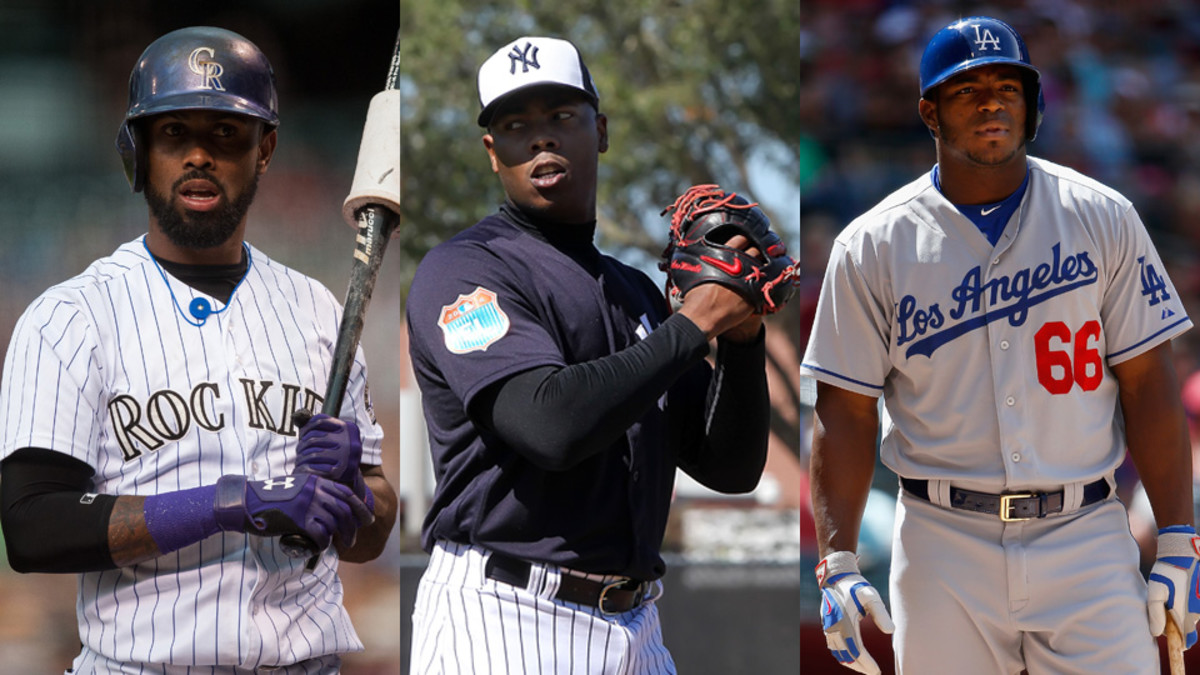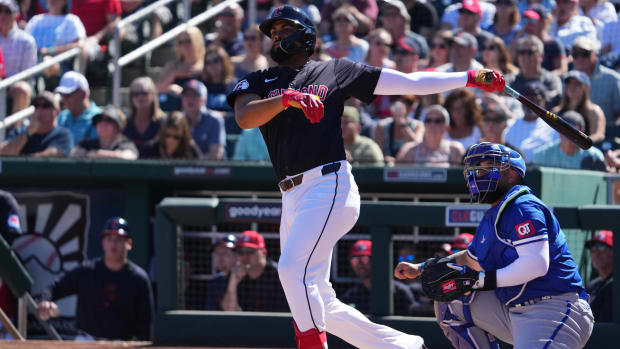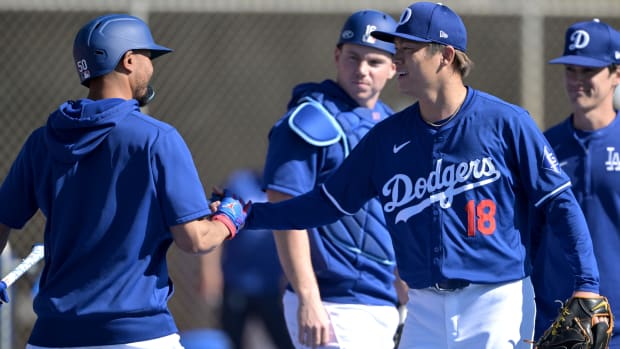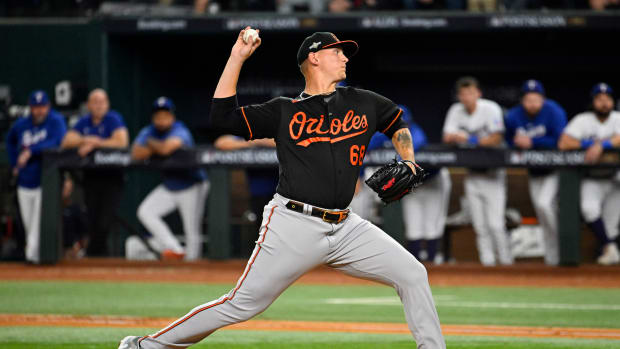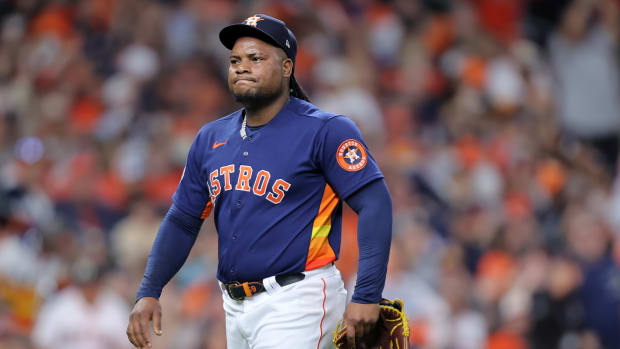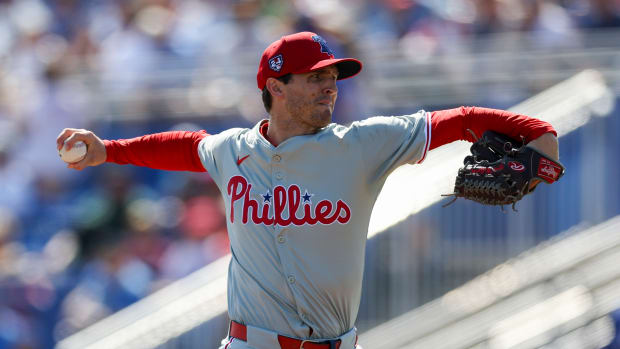MLB's domestic violence policy tested by Reyes, Chapman, Puig
Major League Baseball commissioner Rob Manfred handed Colorado Rockies shortstop Jose Reyes a 52–game suspension on Friday.
The ban follows the adoption of a new league policy for dealing with domestic violence cases. In addition to Reyes, cases involving Los Angeles Dodgers outfielder Yasiel Puig and New York Yankees pitcher Aroldis Chapman passed across Manfred’s desk this off–season after their alleged involvement in domestic violence incidents last year.
The policy was introduced last August, but these three cases were the first tests of the policy’s effectiveness, Manfred’s authority in enacting punishment and MLB’s ability to establish a reputation for enforcing justice.
Why the policy was adopted
It took the oldest sports league in the country 146 years to introduce a policy specific to domestic violence, but MLB put a protocol in place last year amid high–profile incidents in other sports leagues.
When video emerged in September 2014 of former Baltimore Ravens running back Ray Rice punching the woman who was then his fiancée, viewers were both captivated and horrified. NFL commissioner Roger Goodell had sentenced Rice to a simple two-game suspension before the video was released, compounding the outrage at a seemingly botched judgment of an offense that warranted something more severe. The controversy spurred the other major sports leagues to reevaluate their own strategies for handling domestic violence, and not long after the dust settled around Rice—who has since been effectively blacklisted from the NFL—Major League Baseball officials responded by beginning to craft a domestic abuse policy
“I’ll admit, we weren’t on this issue before,” MLB’s chief labor officer Dan Halem told ThinkProgress last April, noting that the league had been more focused on issues of inclusion and sexual orientation before the incidents involving Rice, then-Panthers defensive end Greg Hardy and Vikings running back Adrian Peterson.
The previous policy allowed for the commissioner of baseball to handle punishment for domestic violence incidents on a case-by-case basis, which former commissioner Bud Selig said in September 2014 hadn’t been an issue because he “[couldn’t] remember the last case” presented to the league.
How the protocol works
MLB’s 13-page domestic violence policy details the specific role the commissioner plays in handling the cases of players who have been accused of committing offenses of domestic violence, sexual assault and child abuse.
It gives the commissioner the power to punish players without their being arrested or charged, allowing MLB to enforce its own standard of ethics regarding domestic violence and making it “easier for the commissioner to impose an appropriate level of discipline on players who commit acts of domestic violence or sexual assault and have that discipline be upheld in arbitration,” according to MLB executive vice president Joe Torre.
The provisions of the policy fall into four categories.
Investigation: The commissioner can place an accused player on paid leave for up to seven days before deciding on disciplinary action if he decides “allowing the player to play during the pendency of the criminal or legal proceeding would result in substantial or irreparable harm to either the club or Major League Baseball.” The paid suspension can be appealed to an independent arbitrator.
The commissioner can defer making a disciplinary decision until after any pending criminal charges have been resolved.
Treatment: A policy board has the power to recommend treatment (such as mandatory counseling or psychological evaluation). If players don’t comply with treatment orders, they will be subject to additional discipline. (Previous policy allowed players to enter treatment voluntarily).
Discipline: There are no minimum or maximum penalties, and all discipline can be appealed to the arbitration panel.
If a paid suspension turns into an unpaid suspension, the player must repay any salary he received if he wishes to count the time served during the paid period toward the unpaid suspension.
Education: Players will receive education on domestic violence, sexual assault and child abuse regularly. Players’ families will be given resources for dealing with incidents of domestic violence, including a confidential 24-hour hotline.
The new policy tested
How Manfred choose to discipline Reyes, Puig and Chapman could hold ramifications for future domestic violence cases. Here’s a look at the accusations made against each player and how the commissioner has chosen to proceed.
Jose Reyes
The incident: (Oct. 31, 2015) Reyes was accused of grabbing his wife and shoving her into a sliding glass door at the Maui Four Seasons, when she reportedly sustained injuries to her neck and left leg. Reyes was arrested on charges of abuse of a family or household member, but was released on $1,000 bail. He pleaded not guilty and was set to stand trial on Opening Day before prosecutors dropped the charges, citing his wife’s failure to cooperate.
“This will be the first test,” Manfred said of Reyes’s case in November, “and I think it will stand the test.”
• SPAN: Jose Reyes case a test for MLB, Rob Manfred and a lesson for us all
The result: Manfred exercised his option under the new policy to place Reyes on paid leave while his criminal charges were pending. He missed the first 34 games of the season before his suspension, and his ban will keep him out through May 31. Reyes will also need to pay back all money he received during the paid suspension, costing him almost half of his $22 million salary.
Yasiel Puig
The incident: (Nov. 25, 2015) Police confirmed that Puig fought with a Miami bar bouncer, who allegedly confronted him because Puig was arguing with his sister. The bouncer sustained a “busted lip” and other minor facial bruises, which he said were a result of Puig suckerpunching him. Puig sustained a swollen left eye and other facial injuries. Neither party wanted to press charges, so the police considered the case closed. Police did not think there was any physical altercation between Puig and his sister, despite a TMZ report that he had pushed her. TMZ later retracted the report, but MLB continued with its investigation.
The result: The league decided not to punish Puig under the domestic violence policy, but reserved the right to re-open the case if any new evidence emerges.
Aroldis Chapman
The incident: (Oct. 30, 2015) Chapman was investigated by MLB for allegedly choking his girlfriend and firing eight gunshots in his garage following an argument stemming from something she found on his cell phone. Police closed his case because they determined there was insufficient evidence to charge Chapman due to an absence of physical injuries, conflicting testimonies and lack of cooperating witnesses. The news of the incident disrupted a trade of Chapman from the Reds to the Dodgers, but a deal was later completed to send him to the Yankees.
• CORCORAN: MLB gets strict with domestic violence in suspending Chapman
The result: Chapman was suspended for 30 games on March 1 and did not fight the ruling, despite previously being adamant that he planned to appeal any suspension imposed upon him. He returned to the Yankees on Monday, and will have lost nearly $2 million in salary.






























